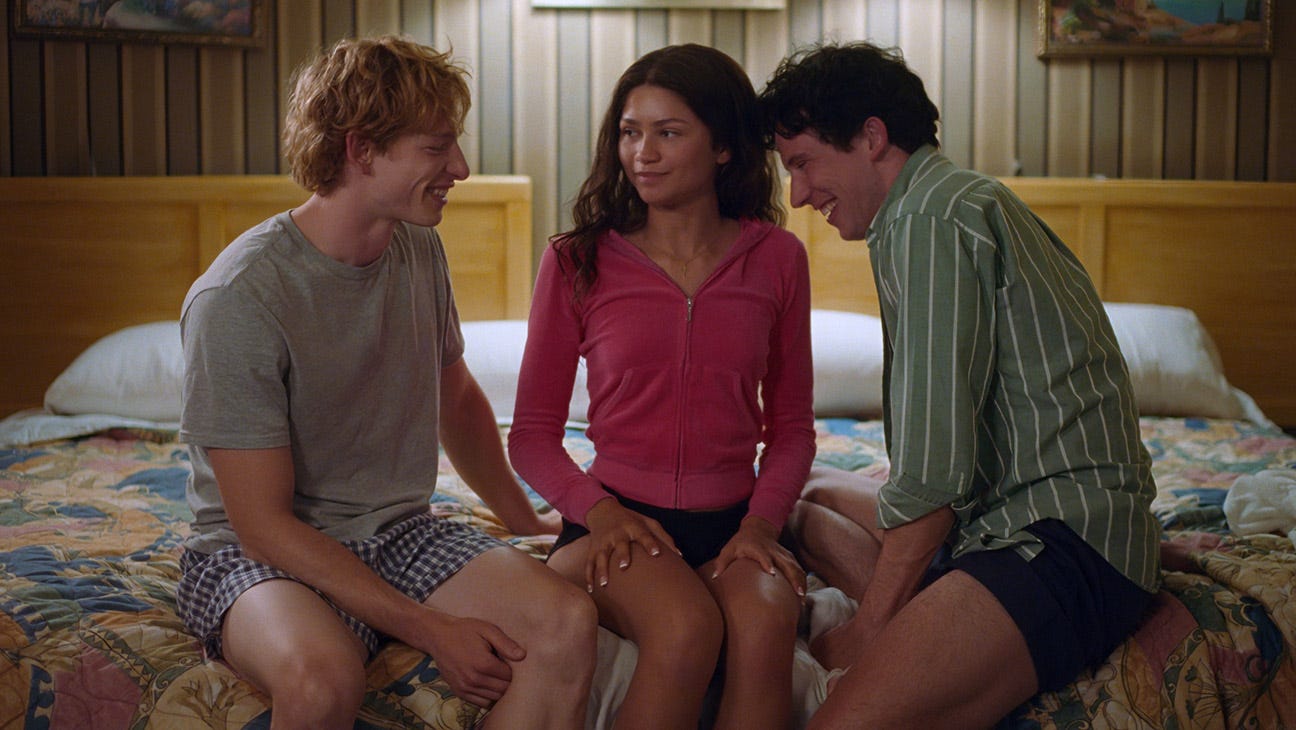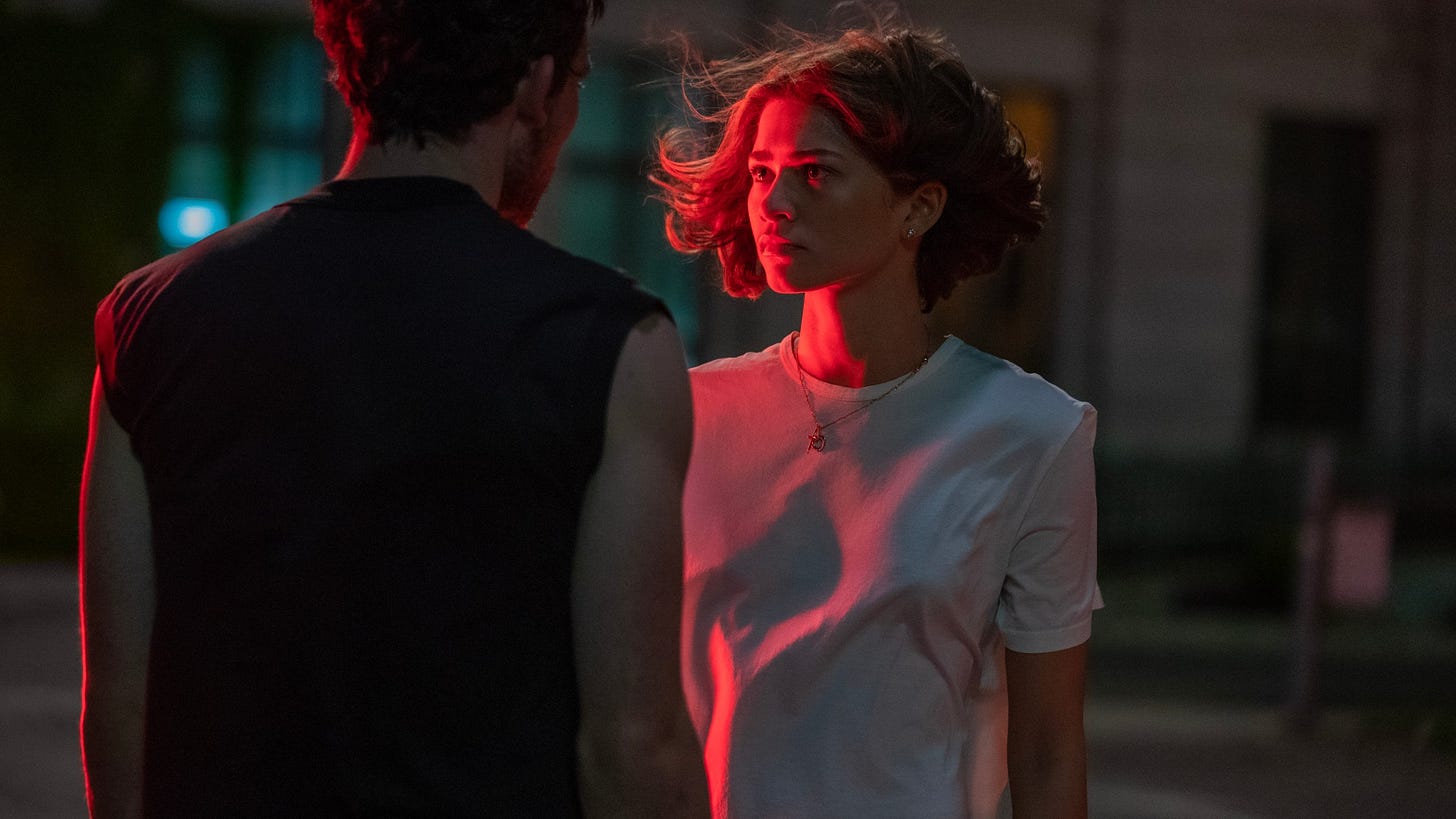'Challengers' review: Call me by your game
Zendaya, Josh O'Connor, & Mike Faist star in Luca Guadagnino's tennis romance
You’ll never believe this, but a movie about sex and tennis draws a lot of parallels between the two, seeing them both as sweaty and often dangerous endurance contests.
If Luca Guadagnino’s Challengers belabors that point a bit too much, it also pleasingly lets its trio of players take turns being the ball that’s lobbed back and forth by the other two. At its best, the film has the air of anxious intimacy that defines his greatest work, though the characters here are decidedly flatter.
Throughout this time-hopping romance, two up-and-coming tennis players, Art (Mike Faist) and Patrick (Josh O’Connor), vie for the affection of a genuine prodigy, a woman named Tashi (Zendaya). Challengers follows the three through a series of professional and personal triumphs, setbacks, and romantic conflicts that span a 13-year period.
Working with a script by Justin Kuritzkes, Guadagnino jumps liberally between the mid-2000s when the three characters are in their teens/early 20s, and the late 2010s when they are in their 30s. (The latter is apparently the time when we’re supposed to have midlife crises now. Can’t relate!)
In the earlier period, Art and Patrick first see Tashi as everyone else in the audience does: gliding confidently onto the tennis court ahead of a match, decked out in her white Addidas uniform.
She’s determined and quiet but strikes the ball with tremendous force; after her victory, she lets out a feral roar that takes Art and Patrick aback. They’re both star- and love-struck, a dangerous combination.
That’s how Tashi likes it, though. Her carnal appetite for victory translates to the bedroom, where she delights in pitting Art and Patrick against each other as they try to win her over. Zendaya plays her like a cipher who only ever has her eyes on a prize, whether that’s a tennis championship or a romantic partner.
When the three of them are still hopeful youths- before injury, failure, and/or rejection lead them to their old, decrepit early 30s (I’m not letting that go!)- she joins the men in their shared hotel room.
This is the film’s strongest scene, portraying erotic gamesmanship with a true sense of unpredictability. Tashi presses the men about their longtime friendship, trying to tease out tinges of homoeroticism.
Guadagnino and his camera do this throughout the film too, lingering on Faist and O’Connor’s partially clothed bodies and framing them in intimate proximity. They’re friends and competitors both on and off the court, but there’s a palpable sense that there’s an unexplored sexual dynamic with them too.
Tashi knows this as well. In this gloriously sticky, rundown hotel room, Art and Patrick sit on either side of her as she takes turns kissing them. As the intensity escalates, she leans back and the two continue making out with each other.
Guadagnino oscillates between Art and Patrick kissing and Tashi looking on, the impromptu makeout session replaced by her deliciously satisfied smirk.
And that’s by and large where the movie stays. Right when it should dive headfirst into the emotionally fraught, endlessly horny passions of college-aged athletes, Guadagnino holds back.
Challengers doesn’t feel chaste by any means, but for this kind of love game to work, we have to know these characters better than we get to. There’s not much exploration of their romantic or sexual dynamic beyond connecting it to their respective athletic skills; Art is a good tennis player Tashi can control and Patrick is a great one who she can’t.
Patrick’s more aggressive nature makes him a better tennis player, and if Art wants to be a true champion he’ll have to wake up and rediscover that youthful spark. (He’s in his early 30s, by the way).
In watching the movie I was reminded of another turbulent romance about wasted youth: Alfonso Cuarón’s Y Tu Mamá También. That 2001 film is tied to the whims of its two thrill- and sex-seeking leads, Mexican teenagers played by Gael García Bernal and Diego Luna. They convince a woman to accompany them on a road trip, and begin competing for her affection without really trying to understand her.
While Challengers doesn’t fully lose its luster in this comparison, I think putting the two films side by side shows what was missing for me here. Though the movie has a pulse, the spontaneity that Guadagnino seems to be grasping at often remains out of reach. He restrains the more intense emotions that may have otherwise given it the volatility he was able to tap into in Call My By Your Name, I Am Love, and A Bigger Splash.
Instead, much of Challengers feels a little too overdetermined; even a hookup set during a hurricane feels excessively choreographed. Save for the early hotel scene, the movie is never as interesting (or erotically charged) off the court as it is on it. In these sequences, the movie feels fully alive; sweat flows like rain, and the athletes scream and smash their rackets when their opponent one-ups them.
There are times when Guadagnino throws his bag of formal tricks in a blender to see what sticks. At different points in the film, and sometimes in the same scene, tennis matches are filmed: in first person, from the point of view of the ball, from beneath the court, in slow motion, and as if they were airing on TV, with the score displayed in the corner.
Cutting this loose on the tennis court only highlights the movie’s limitations off of it, though. A propulsive Trent Reznor and Atticus Ross score can only go so far when a filmmaker is hedging his bets.
Challengers is in theaters April 26




